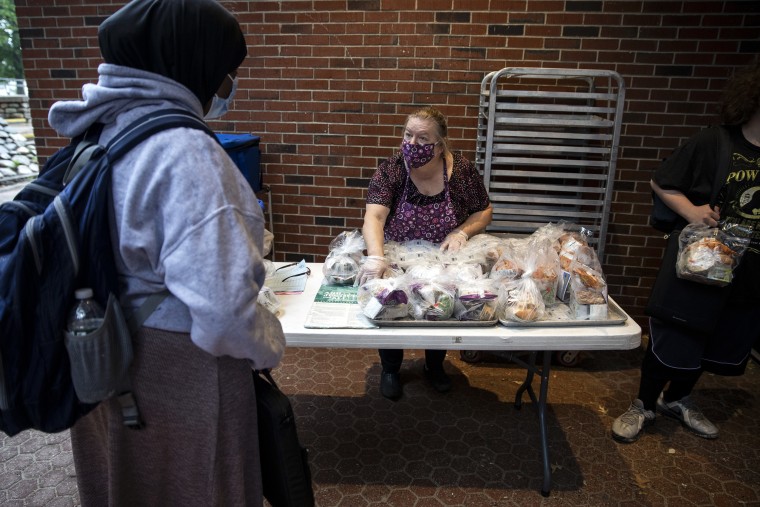By Elizabeth Chuck
The House of Representatives approved a bill on Thursday to expand food assistance measures for children.
The move drew praise from activists, who recalled that the legislation would help millions of children access meals as inflation makes it increasingly difficult for many parents to make ends meet.
The project was approved in the Chamber by 376 votes in favor and 42 against.
The bill is awaiting a vote in the Senate.
[The end of free school lunches in the US will create a “perfect storm” amid high inflation]
The bipartisan legislation would prevent some of the dozens of child nutrition exemptions that Congress has granted to the Department of Agriculture.
The pandemic-era waivers had been set to expire next Thursday.
But the new bill, titled the
Keep Kids Fed Act
, would not extend the most innovative of federal exemptions: the one that makes school breakfasts and lunches free for all students, regardless of age. the income of their families.
Still, anti-hunger advocates expressed relief that an agreement had been reached.
The legislation would allow summer meal program providers to operate with more flexibility and help schools in the coming academic year as they continue to deal with supply chain disruptions and labor shortages.
Parents concerned about the expiration of the free food program at summer camps
June 23, 202202:16
“Even though this bill doesn't have everything we hoped and dreamed of, it still has a lot,” said Lisa Davis, senior vice president of the No Kid Hungry campaign for Share Our Strength, a nonprofit organization working to end child hunger. hunger and poverty.
“The most important thing is that they are providing relief to those families who are on the edge.”
[How to talk to children after the school massacre in Texas? An expert shares recommendations]
Crystal FitzSimons, director of school and after-school programs for the Food Research and Action Center, an anti-hunger organization, said it was "exciting to have a bipartisan commitment" on child nutrition programs.
“It should be a bipartisan issue,” he clarified.
Before March 2020, children from families with incomes at or below 130% of the federal poverty level were eligible for free school meals, while those from families with incomes between 130% and 185% of the poverty level were entitlement to reduced-price meals through the Department of Agriculture's National School Lunch Program.
The new bill would eliminate reduced-price meals, allowing those who qualify to get free meals instead of paying 40 cents for lunch and 30 cents for breakfast.
[They record how a Latino driver of a sports car crashes into a school bus for racing at full speed]
Advocates of this measure have lobbied in the past, according to Diane Pratt-Heavner, a spokeswoman for the School Nutrition Association, a trade organization that represents more than 50,000 school nutrition employees.
“While 40 cents for lunch may not sound like much, if you have three kids and you're trying to feed them five days a week, that can really add up,” he said, adding that for the 2021-22 school year, a family of four You would have to have earned $34,450 or less to qualify for free meals or $49,025 or less to qualify for reduced-price meals.
Deborah Jendrasko hands out free lunches to students at Deering High School in Portland on Friday, July 9, 2021. Brianna Soukup / Portland Press Herald via Getty Images
Universal school meals eliminated the paperwork to qualify for free or reduced-price meals: for the past two years, all students simply received free breakfast and lunch.
The adjustment to refilling applications could be a surprise, or it might not be properly communicated to families, according to Davis.
“As we transition back, I am very concerned about families who may not be aware that they are going to have to take an affirmative step for their children to receive those meals, and there are children across the country who will fall for it,” she said. .
[Latina girls are attacked for speaking Spanish on the school bus: "I don't care if there are racists, I will continue to speak my language"]
The Keep Kids Fed
Act
was a last-minute compromise after the extension of exemptions was left out of the general spending bill that Congress passed earlier this year.
Politico reported that Senate Minority Leader Mitch McConnell, R-Kentucky, and other party members opposed expanding funding for school meals because of its cost, some $11 billion.
A McConnell aide denied this, saying there was never a proposal for him to turn down.
The
Keep Kids Fed
law was introduced Tuesday by Sen. Debbie Stabenow, a Democrat, and the Speaker of the House of Representatives.
Debbie Stabenow, Democrat-Michigan, and John Boozman, Republican-Arkansas, and Congressmen The bill would be paid for by offsets, meaning it is budget-neutral.
“With 90% of our schools still facing challenges returning to normal operations, this will give our schools and summer meal programs much-needed support to address ongoing food service issues.
Congress must act quickly to approve this critical aid," Stabenow said in a statement Tuesday.
Forget about the stress when traveling with children with these recommendations to pack everything without problem
June 22, 202206:51
The flexibility the measure would expand for summer meal program sites would be a lifeline for many families, advocates said.
Among the things it would allow: Centers could continue to offer grab-and-go meals, so parents could bring multiple meals for their children at once, rather than having to drive their children back and forth to eat at the center .
There would also be fewer geographic restrictions than if the exemptions expire.
[“The children are not well”: school counselors ask for urgent help after the shooting in Buffalo]
“Having summer meal sites in communities across the country where struggling families can easily pick up meals is going to be critical to help support the family budget, reduce financial stress and reduce the household food budget,” FitzSimons opined.
"Ensuring that these summer meal sites are accessible in every community across the country will be a critical support in relieving the stress that so many families are feeling right now," he added.







/cloudfront-eu-central-1.images.arcpublishing.com/prisa/637CACUX5L6LSAVALJA2TRYTGU.jpg)







